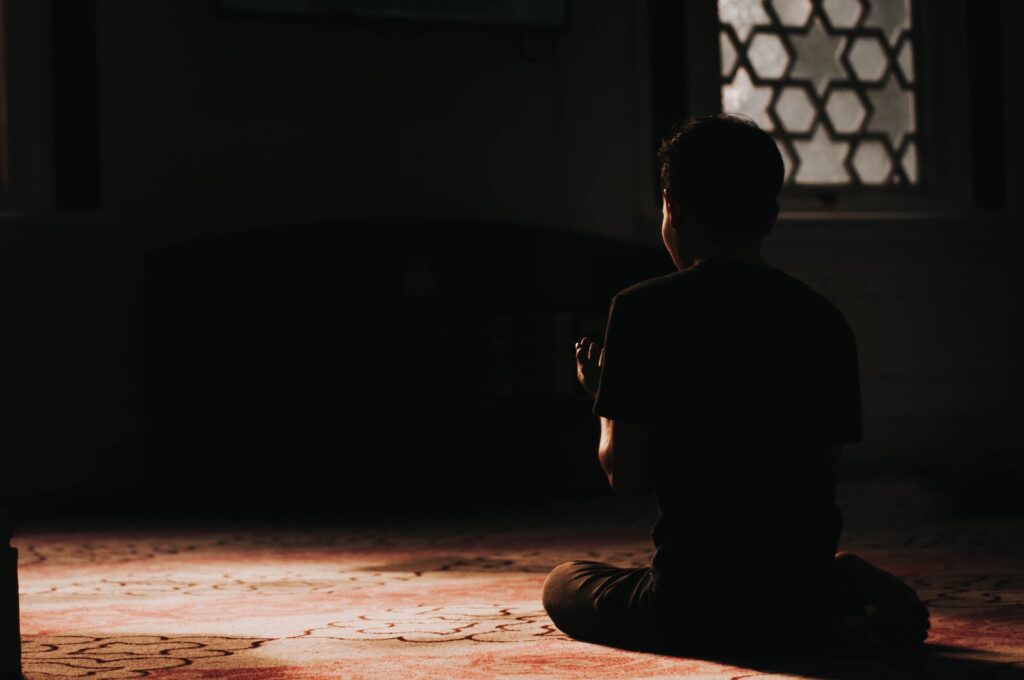The reason for Ramadan is not to feel for the poor.
Otherwise, poor people would be exempt from fasting.
Is the reason for Ramadan to take care of our bodies?
Nope. Otherwise, healthy people would not have to fast.
The light bulb produces heat. But this is not the main reason we buy it for.
We buy a light bulb to illuminate our surroundings.
Similarly, Allah ordered the celebration of Ramadan for a primary reason.
Any secondary benefits are by-products.
Focusing on the primary gives us a chance to experience Ramadan as Allah wants it.
There’s nothing unique about fasting.
Hindus, People of the Book, or athletes, are all practicing some form of fasting.
But what distinguishes us as people is Ramadan.
If the way we envision Ramadan is right, our actions will be right as well.
Fasting vs Ramadan
Fasting and Ramadan have different purposes.
“O believers! Fasting is prescribed for you—as it was for those before you—so perhaps you will become people of Taqwa.” [Quran 2:183]
Taqwa is an Arabic word often translated as the fear of Allah.
But the real meaning is protection.
The people of taqwa protect themselves from any kind of harm or danger.
Our inner self doesn’t always want our best interest.
By saying no to our most fundamental needs, we build discipline.
It becomes easier to say no to other things that can harm us — backbiting, earning dirty money…
When we refuse ourselves food, drinks, and intimate relationship, we let the door wide open for our divine self:
“And when I form him perfect and blow in him of My spirit, you fall down before him, prostrating.” [Quran 15:29]
So what makes Ramadan different from other fasting times?
Ramadan As Allah Wants It

Everything has its own time. And Ramadan is the time of the Quran.
“Ramadan is the month in which the Quran was revealed as a guide for humanity with clear proofs of guidance and the standard to distinguish between right and wrong.” [Quran 2:185]
What Allah highlights about Ramadan is the Quran, not the meals or entertainments.
We need to keep in mind that the miracle of Muslims is their book.
And it’s different from any miracle that had been given to previous Prophets.
Salomon commanded the wind. Moses parted the sea. Jesus resurrected the dead.
These are jaw-dropping moments for anyone who witnessed them.
But for the next generation, it’s just a story. And for the ones coming after, it’s just old stories without any effect.
The Quran is not a miracle for the eye, but a miracle for the ear.
Each generation can listen, dig into it, and discover something new and mind-boggling.
The Quran is a book that keeps giving. We can never say the Quran has no secrets for us.
If we want to benefit from each Ramadan, we need to re-engage with the Quran like it’s the first time we read it. Without any assumption.
Fasting helps us to focus and be in the right state to engage deeply with the Quran.
And when we discover something new, it’s like a second revelation.
We start seeing things in a different light. And our intimate relationship with Allah gets stronger.
We can’t prove to anyone what’s happening inside us. But it’s there.
This beautiful state doesn’t come effortlessly.
At the minimum, we need to have the genuine intention to know Allah a little bit more than the year before.
The Spirit of Ramadan

Our connection to Allah can take different forms during Ramadan.
It can be by reading the Quran and its explanation, listening to recitations, night prayers, acts of remembrance…
These are all vertical acts of worship. They aim to connect us with the One above.
But Islam is not an individualist religion.
Whatever goodness we gain from our vertical connection, we share it horizontally.
In other words, Ramadan is also the month we engage with people and have concern for them.
It can be through family time, charity, volunteering, or sharing some good words with people around us.
In general, people are more receptive during Ramadan.
Some of them struggle the whole year to implement good habits or to get rid of bad ones.
With a little bit of support, we can help them change for the better.
Ramadan is unlike any other ritual.
Salat refuels us from one prayer to the other.
The Friday sermon from one week to the other.
But the Ramadan effect lasts from one year to the next one.
This is how powerful Ramadan can be.
When we combine fasting, the Quran, and helping others, Ramadan turns into a transformative experience.
Final Thoughts

Ramadan is not a number game.
You can finish reading the Quran many times and get zero out of it.
Ramadan is not a sprint.
We don’t want to start strong and miss the end. Especially when the best night is one of the last ones!
So to get the most out of Ramadan, we need to plan wisely.
Ramadan comes with challenges — lack of time, energy, sleep, or proper nutrition.
These concerns need to be addressed upfront.
Other points worth considering are:
- How will we manage our time
- How will we rearrange our priorities
- Which part of the Quran do we want to focus on
- Which additional spiritual activities can we sustain doing for the next 30 days.
With a strategy and the purpose of Ramadan in mind, we can have a month as Allah wants it.
May Allah grant us all a successful Ramadan.
Article posted the 12 April 2021
Popular Articles
- 7 Lessons from Luqman that Will Make You Wise
- How to Enjoy Salat and Make it Meaningful
- Mongols Invasions: Some Forgotten Lessons to Today’s Muslims
- For or Against Vaccines? That’s Not Really the Question
- Are Muslims Meant to Be Sleep Deprived?
- Islamic Psychology: A Model Where Faith Has Its Place
- Muslims Judging Each Other: Why and How to Be Less Judgy
- The Value of Time
- 3 Tips to Unlock the Believer Mindset
- The Certainties of Muslims in Uncertain World
- Allah According to Allah: The Beauty Behind the Verse of Light
- How to Make People Change their Mind: Persuasion!
- 5 Powerful Duas from the Quran to Help You in Both Worlds
